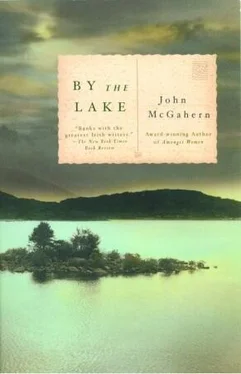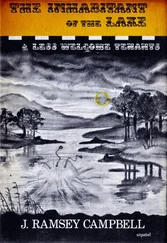“Why would I want to change?” he demanded.
“The place has been your life. Once you sell, it won’t be yours any more. You’ll no longer have any say. He’ll be able to sell it on to someone else or tell you he no longer wants you round and there’s not a thing you’ll be able to do. I’m not saying he’s likely to do any of these things. In fact, I think it’s most unlikely, but once you sell you’re gone. Now is the time to be sure.”
“I’d love it if he told me he didn’t want me near the place. I’d be out the door before he had time to turn.”
“As long as you know,” Ruttledge said.
“I know full well. Too many hang on till they’re staggering round the place. There’s a time for everything. That boy is going to get some land. It’ll take some of the sleep out of his eyes.”
“I’ll go ahead, then, with the sale if that’s what you want.”
“Go full ahead. And take care! You may find that the banks may be in no rush to hand out loans when they see the boy they have on their hands,” he started to shake silently.
“As long as you are sure?”
“I’m certain. It’s time.”
The ground had become soft and unpleasant for walking and they did not go further than the hanging hill above the inner lake from where they were able to count the sheep. Several swans were sailing on the lake amid dark clutches of wildfowl. The occasional lone heron flew between the island and the bog. Nothing was sharp. The lanes of watery light that pierced the low cloud from time to time seemed to illuminate nothing but mist and cloud and water. The sedge of Gloria Bog and the little birches had no colour. The mountains were hidden. From this hanging hill the Shah had always looked across the lake and bog towards those mountains. Increasingly, the way he stood, his right hand resting firmly on his hip, his feet wide apart, reminded Ruttledge of the way his grandmother had stood at her half-door in old age. She had been a good-looking, vigorous woman even then, with a great sense of fun. The way she stood was like a symbol of her independence and spirit when her other advantages had disappeared.
“The rain comes down. Grass grows. Children get old,” the Shah said suddenly. “That’s it. We all know. We know full well and can’t even whisper it out loud. We know in spite of them.”

At that same time Kate was offered tempting work in London.
Every summer Robert Booth came from London. When the Ruttledges first moved to the lake, other visitors had come from London, but over the years they dwindled until Robert Booth was their only serious connection with that busy world to which they had both once belonged, a world that was growing increasingly distant.
Robert Booth came from humble origins in the North of Ireland, a small draper’s brilliant son. Scholarships took him all the way to Oxford, where his studies were interrupted by the war. After the war he returned to take a double-first in history and classics and then entered the law to discover that it wasn’t acceptable to practise at the Bar with a thick regional accent; so he took himself to acting school where he acquired the accent that would serve him for the rest of his life, its only flaw being that it outdistanced what it sought to emulate.
He was reasonably successful as a barrister but felt too exposed, too much on his own: he was an outsider who always wanted to be on the inside. When offered a partnership in a young advertising firm by people he had known at Oxford, he abandoned the law with relief. Within the firm he rose steadily. He had interviewed Ruttledge when he applied for a copywriter’s position in the firm a few years after arriving in London. He already knew Kate and Kate’s father. At their marriage he had been one of the two witnesses. He had been against their decision to leave London, and without the freelance work he put their way after they left, the first years by the lake would have been more difficult. From time to time he had been able to arrange for Kate to return to her old position in the firm for short periods.
In those years he came on the bus, which dropped him at the end of the road. Ruttledge met the bus and they walked slowly round the shore, Ruttledge carrying his suitcase, Robert Booth using a rubber-topped walking stick to help him through the potholes and loose stones.
In later years Ruttledge met him each year at the hotel by the river in Enniskillen and drove him to the house. He waited by the hotel bar where he had a view of the entrance. A wide lawn sloped down to the Erne, where pleasure-boats were tied up at a wooden dock. Further down, the new theatre stood beside the high stone pillars on which the railway once had crossed the river.
A large black car drew up at the entrance of the hotel. A tall, elegant, middle-aged woman in tweeds got out from behind the wheel and walked to the passenger side to open the door for Robert and hand him a travelling case from the back seat. He used his walking stick to lift himself slowly from the seat. The couple stood for a minute smiling and exchanging words. The woman’s dress and manner spoke of golf and bridge and dinner tables, children at good schools or university, books perhaps, but strict conformity within a class of money and comfort. They embraced. She had been leaving him at this hotel for years but Ruttledge had never met the wife of Robert Booth’s brother. All his various social lives were kept within separate compartments and were never allowed to cross. Robert stood politely in the entrance as the car drove away. As soon as it banged on the cattle grid over the entrance, he raised his walking stick and turned and entered the hotel.
“A very great pleasure,” he said.
They had a drink at a table in the near-empty bar and Robert talked of his stay at his brother’s weekend cottage in Donegal, the people they both knew in London. As they walked to the car, Robert said politely how much he was looking forward to seeing Kate again. Ruttledge knew Robert and yet he hardly knew him. He knew only what Robert Booth chose to reveal, which was very little, or let slip involuntarily. He was a secretive, complicated man and much was hidden, Ruttledge suspected, from himself as well as from most other people.
The friendship had been always intertwined with business. It was unlikely that one would have survived without the other. Robert Booth looked better now than when Ruttledge first knew him. Time had softened his ugliness and slowed his ungainliness.
The road was wet with summer showers as they drove towards the border, the fields and houses neater and better tended than in the South. Many had flower gardens. At the checkpoint they sat in a queue of cars behind a ramp until a green light allowed them into the armoured and sandbagged compound. All around was a wilderness, small fields of rushes and sally and scrub with the occasional isolated house. Above them stood the bare slopes of the mountain.
Ruttledge had asked Robert Booth once how he had found the class system when he first arrived at Oxford, he who now seemed so at ease within its mazes.
“It was quite easy,” Robert Booth answered agreeably. “When we were growing up we felt superior to the Catholics. The first step is always the hardest. After that it is easy.” Ruttledge doubted if that could be admitted so openly and confidently now.
A young soldier carrying a machine gun read the car number into a wire grille in a camouflaged steel hut and waited until someone working the computer within the hut gave the all-clear. Another soldier stood close by on guard. They both wore boots and combat dress and had a look of drilled efficiency. Ruttledge handed the soldier his driving licence. He was friendly and personable as he took and checked the licence. Ruttledge gave his name, his trade, his date of birth, his address.
Читать дальше













